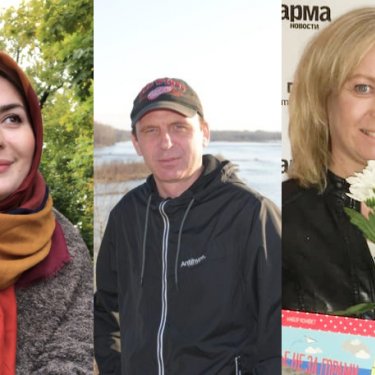Russia: punishing journalists still daring to cover war in Ukraine

The Russian authorities have begun using arrests, raids and fines to harass journalists accused of publishing “false information” about the Russian army’s actions in Ukraine. Reporters Without Borders (RSF) condemns this witchhunt and the growing climate of impunity for attacks on journalists, and calls for the withdrawal of laws establishing censorship.
Читать на русском / Read in Russian
After dispatching the national independent press, the Russian authorities are now targeting critical local media outlets by means of the new laws establishing war censorship. The victims include Listock, a small newspaper based in Gorno-Altaysk, in western Siberia’s Altai region, which was fined 300,000 roubles (3,300 euros) yesterday for articles “discrediting” the Russian army), while its editor, Olga Komarova, was fined an additional 100,000 roubles (1,100 euros). These are not insignificant sums for a small publication, and more fines could follow.
Listock’s owner, Sergei Mikhailov, was jailed in Altai yesterday after being arrested the day before near Moscow, while his home and the newspaper’s premises were searched. He is now facing up to 15 years in prison on a charge of publishing “false information” about the Russian army in Ukraine in his newspaper. Listock has provided non-stop coverage of the war from the start – including an interview with Volodymyr Zelenskiy, anti-war columns and reports about the Bucha massacre – and has repeatedly used the word “war” although it is banned by Roskomnadzor, the media regulator.
A similar sequence of events took place on 13 April in eastern Siberia’s Khakassia region. Police raided the apartment of Mikhail Afanasyev, the editor of the local online newspaper Novy Focus, and confiscated his equipment in reaction to a – now deleted – article about riot police refusing to go to Ukraine and about the activities in Ukraine of soldiers from Khakassia. Afanasyev is now being held in Abakan, the region’s capital, pending trial.
In the southern Siberian city of Prokopyevsk, Andrei Novashov, a correspondent for Radio Free Europe/Radio Liberty’s local offshoot, Sibir.Realii, has been under house arrest on a “false information” charge since 22 March for sharing a video on the Russian social media Vkontakte about Russian army attacks on the Ukrainian city of Mariupol.
In Kudymkar, in the Urals region, Parma-Novosti editor Yana Yanovskaya was fined 50,000 roubles (550 euros) on 30 March for “discrediting” the armed forces in an anti-war editorial. Proceedings were initiated on 25 March against Isabella Evloyeva, the editor of Fortanga, the Caucasian Republic of Ingushetia’s only independent news website, for writing in a Telegram post that the letter Z used on Russian tanks in Ukraine was “synonymous with aggression, death, pain and barefaced manipulation.”
Other journalists have been sentenced in the southwestern city of Elista, in Kemerovo (in eastern Siberia) and in the Sverdlovsk region (in the Urals).
“The Russian authorities have embarked on a painstaking witchhunt designed to silence the few local journalists still daring to provide reporting or commentary that runs counter to the prevailing propaganda about the war launched by Russia in Ukraine,” said Jeanne Cavelier, the head of RSF’s Eastern Europe and Central Asia desk. “The terrible blow dealt to the national media was a signal authorising local authorities to eliminate the last critical regional newspapers. Trampling on press freedom and the related international obligations only further isolates Moscow on the world stage. RSF calls for the repeal of the laws establishing censorship.”
Under an amendment adopted on 4 March, any Russian or foreign person can be sentenced to up to 15 years in prison for spreading “false information” about the Russian armed forces. Many independent media such as Novaya Gazeta, The Bell, Taiga.info, VPost and Prospekt Mira responded by announcing that they were terminating their coverage of the war in Ukraine and deleting previous stories about it in order to protect their journalists from criminal prosecution. Under another law passed on 22 March, “false information” about the activities of “Russian state bodies” operating abroad – including the presidency, executive, parliament, national guard and Federal Security Service (FSB) – is also punishable by up to 15 years in prison.
A bill due to have its first reading in parliament on 18 May aims to complete the control that the authorities exercise over news and information. It would allow the prosecutor-general to cancel the licence of any Russian or foreign media outlet and immediately block them – without warning and without reference to a court – in response to the dissemination of “false information” about the army, “lack of respect for the authorities,” calls for sanctions, and participation in “unauthorised events.” The licences of foreign media could also be rescinded “in retaliation” if they are from countries that have banned or restricted access to a Russian media outlet. The sanction will be final. There is no provision for any appeal procedure.
In a sign of the climate of impunity threatening journalists, Novaya Gazeta editor and Nobel peace laureate Dmitry Muratov was attacked on the Moscow-Samara train on 7 April by a man who sprayed him with a mixture of red paint and acetone. After conducting their own investigation into the attack, the newspaper’s staff denounced the inaction of the police.
The environment of total censorship – in which most media have been blocked or forced to close and outspoken journalists are in danger – is prompting a massive exodus of Russian media personnel. Together with its partners, RSF is supporting Russian journalists by means of its Operation Collateral Freedom, which enables media outlets to circumvent censorship, and the JXFund, which helps them to continue working from abroad.
Russia is ranked 150th out of 180 countries in RSF's 2021 World Press Freedom Index.



